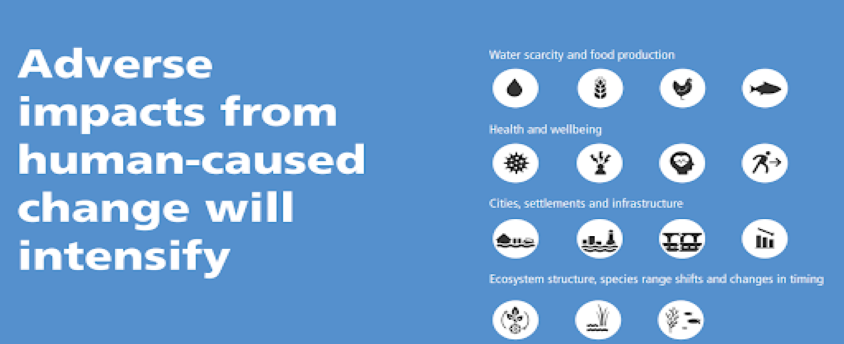IPCC Synthesis report
25, Mar 2023

Prelims level : Environment
Mains level : GS-III Environment - Biodiversity & Environment conservation.
Why in News?
- The Intergovernmental Panel on Climate Change (IPCC) released its Synthesis Report for the Sixth Assessment Cycle on March 20 in Interlaken, Switzerland.
- This Synthesis Report (SYR) of the IPCC Sixth Assessment Report (AR6) summarises the state of knowledge of climate change, its widespread impacts and risks, and climate change mitigation and adaptation.
- It integrates the main findings of the Sixth Assessment Report (AR6) based on contributions from the three Working Groups.
- WG I evaluated the physical science basis of climate change; WG II evaluated the impacts, adaptation, and vulnerability, and WG III evaluated the mitigation.
Highlights of the report:
- The report highlights the urgency of drastically reducing the emission of greenhouse gases and thereby limiting rising global temperatures by 1.5°C from pre-industrial levels, set by the Paris Agreement.
- The report says that the planet’s best chance to keep temperatures below 1.5°C is to ensure greenhouse gas emissions are reduced to 48% of 2019 levels by 2030 and 99% by 2050.
- The report also recognises the impact of the rise in temperature which has made people much more susceptible to food insecurity and water shortages with vulnerable populations disproportionately facing the brunt of climate change.
unnamed 54
- The report, therefore, stressed the need for financial resolution for a more equitable world.
- The report stresses the need for finance to flow from developed countries to developing countries and the need to compensate countries that are poised to lose the most from climate change, to help them build resilience.
- The report also emphasised the role of financial investments to achieve climate goals and encouraged public funding through central banks, government and financial regulators to reduce emissions, scale up climate resilience and protect marginalised communities.
- The report highlighted the benefits of climate-resilient development in mitigating the effects of climate change and also in providing wider benefits.
- Access to clean energy, improving air quality, increasing employment opportunities, boosting healthcare through technology, and delivering equity are among the report’s recommended goals to help adapt to climate change.
Implications for India:
- The IPCC Synthesis Report underscores the urgency of action to address climate change and its impacts, particularly in countries like India that are already vulnerable to its effects. It highlights the need for a concerted effort by governments, businesses, and individuals to reduce greenhouse gas emissions, adapt to the changing climate, and build resilience to the inevitable impacts of climate change.
- The report has been “welcomed” by India, which noted that several parts support its stance that unequal contributions are to blame for the climate crisis and that climate justice must underpin mitigation and adaptation.
- Several messages emerge in the report that are salient for India as it suggests a strategy that emphasises “climate-resilient development.”
- However, India’s priority should be to minimise loss and damage in terms of lives, livelihood and biodiversity, and accelerate equitable action and adaptation.
- As a developing country, India can lower its per-capita emissions through energy efficiency policies already being implemented in almost every sector. It can also decarbonise the energy sector by using cleaner options like solar and renewable energy.






